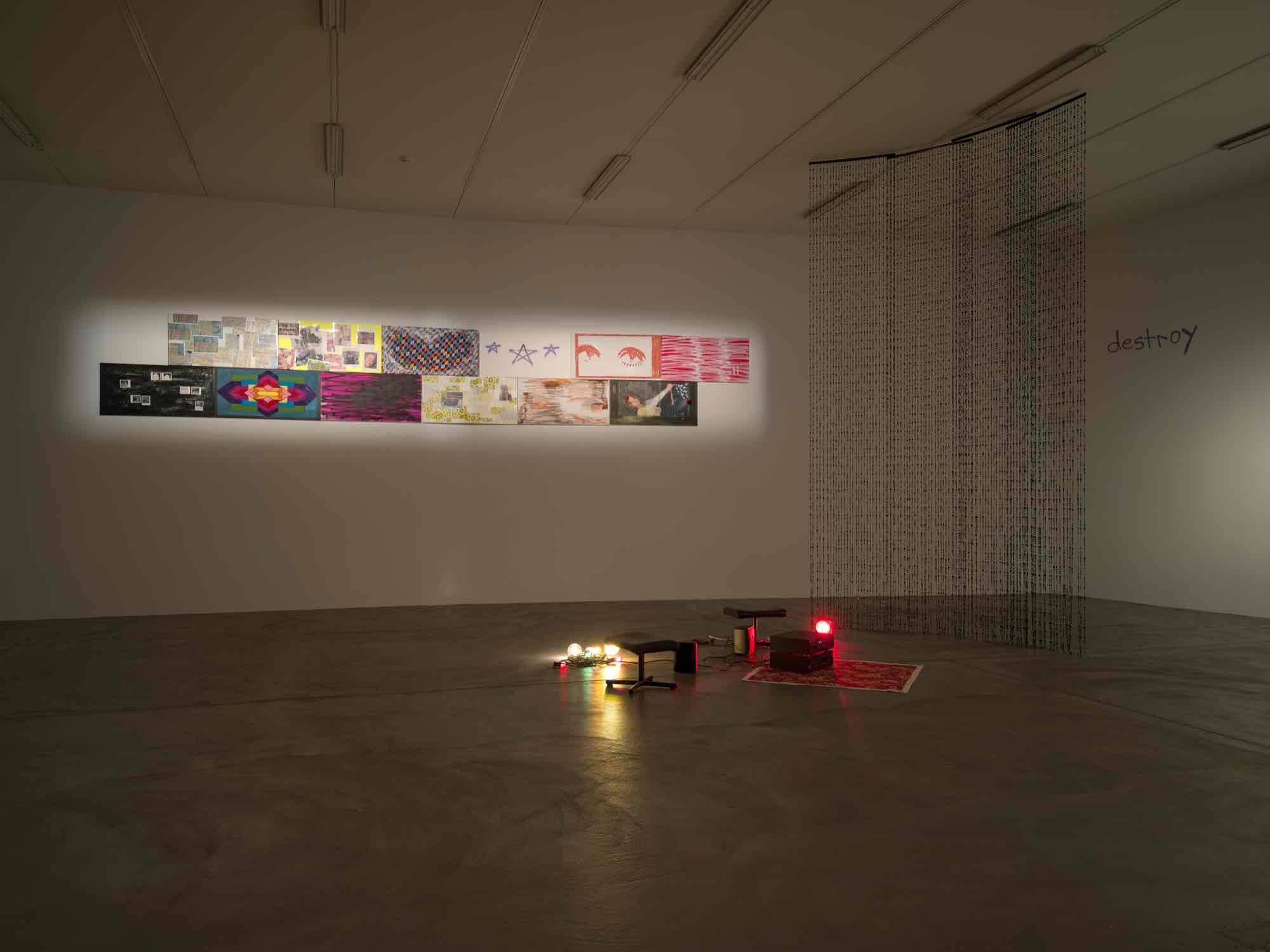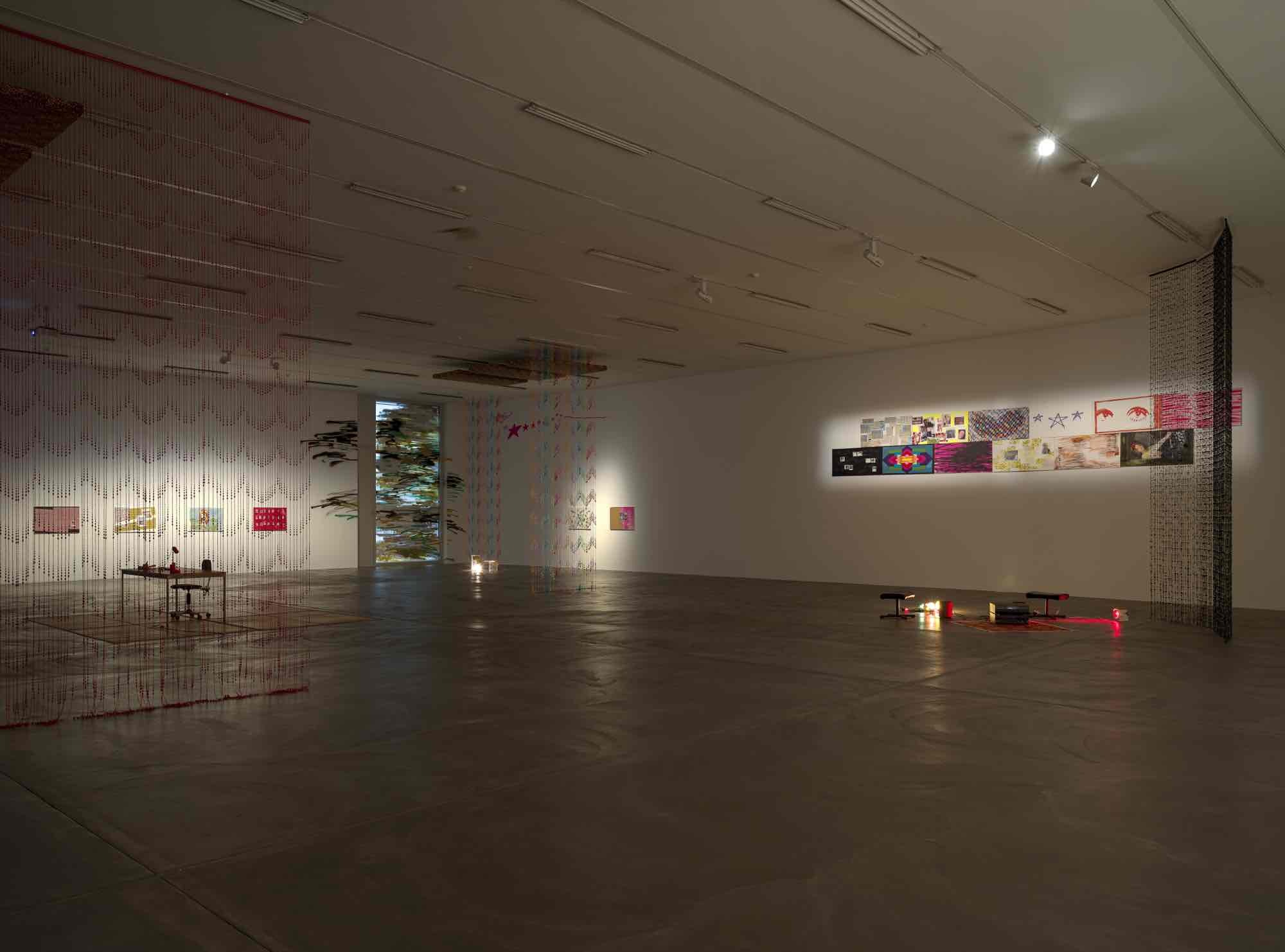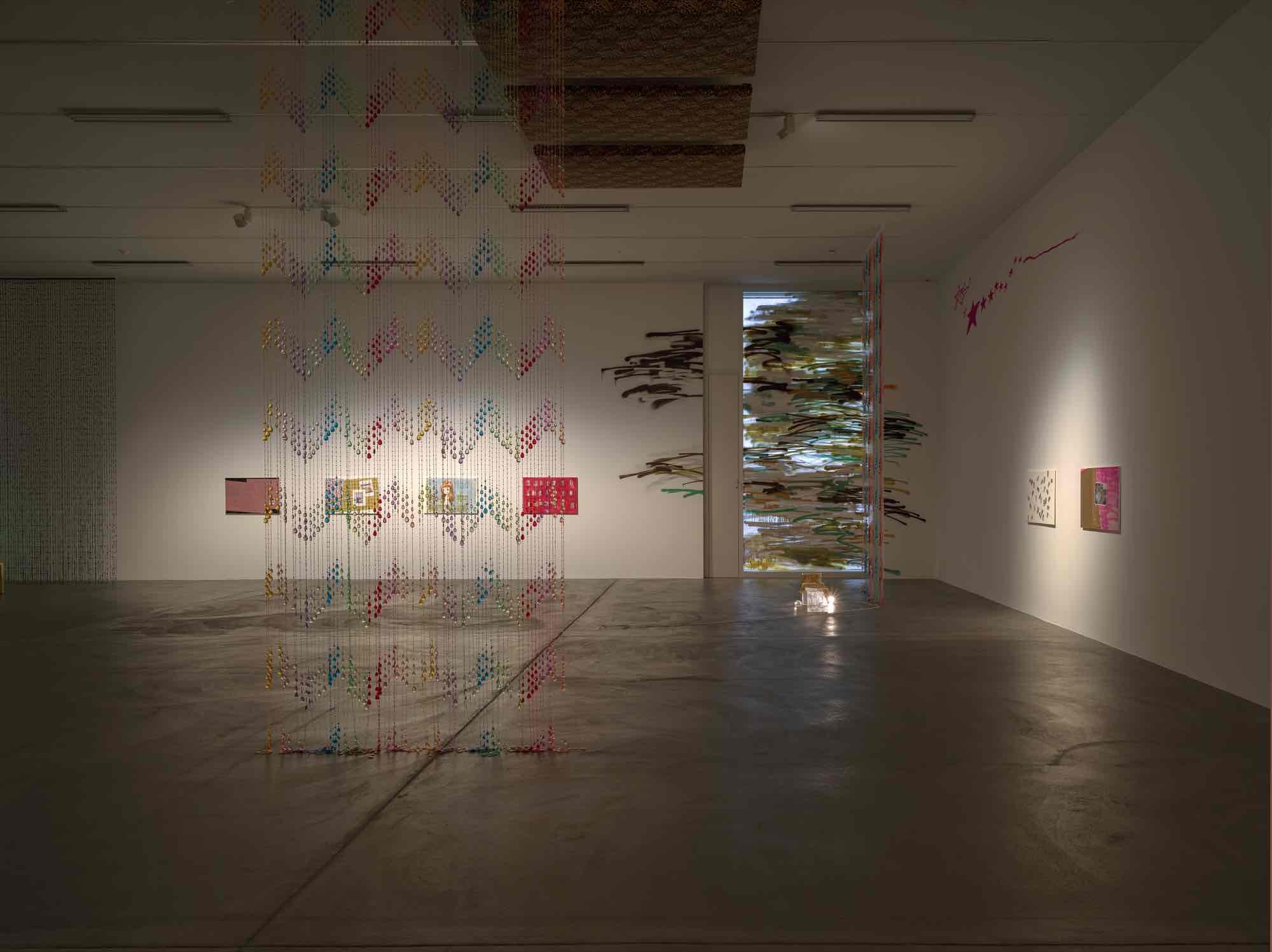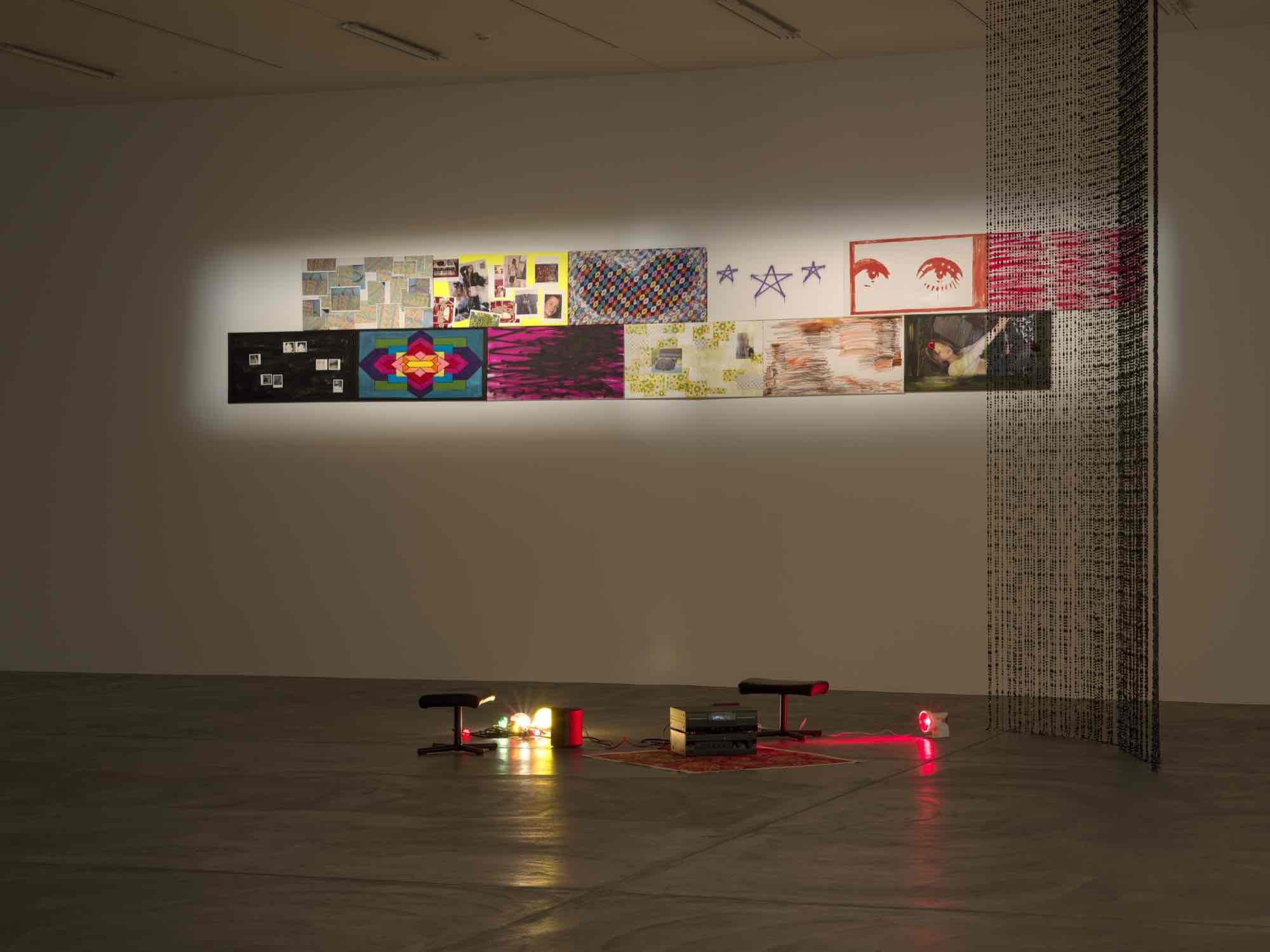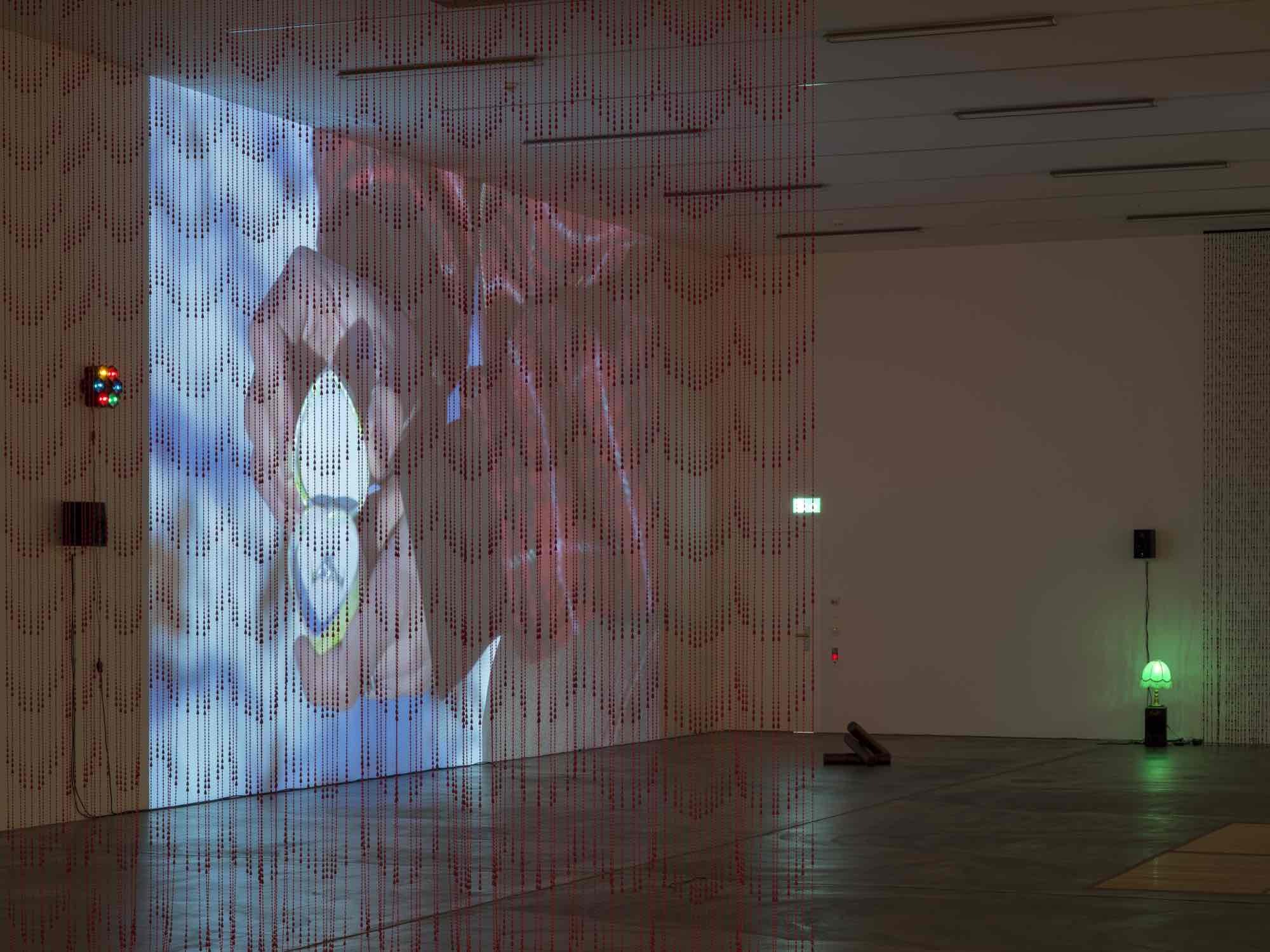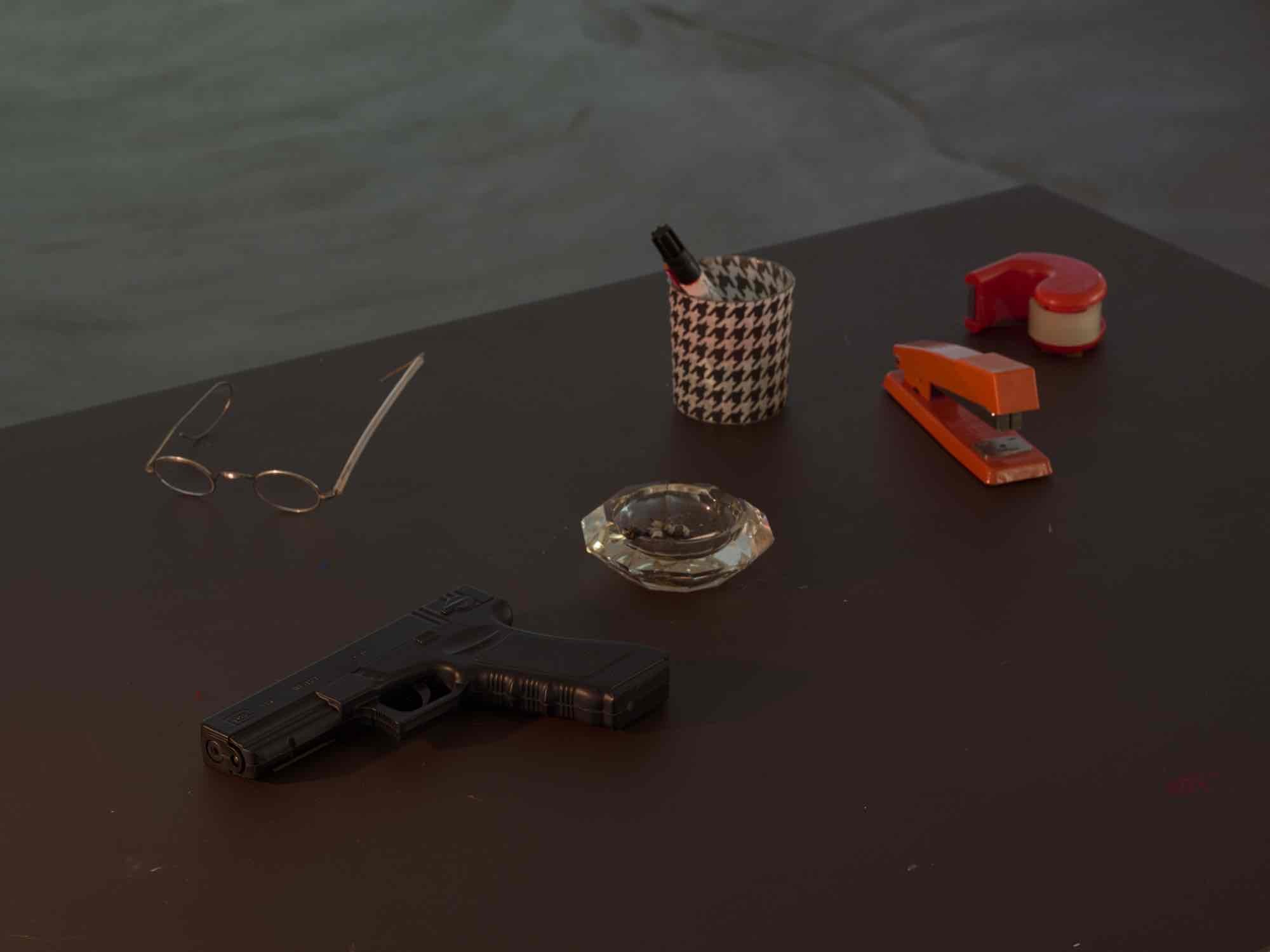Maggie Lee
Magazine
10 Feb - 20 May 2024
The exhibition Magazine was born out of the artist’s long-held desire to publish her own magazine – a very personal magazine that would nonetheless circulate further than just her own circle of friends. Maggie Lee’s passion for this medium of distribution was inspired by her work in copy stores, and above all by creating zines since her teenage years in New Jersey. There is a special appeal to the creative self-realisation in self-publishing, which has developed into a scene of its own ever since cheap reproduction became accessible. This appeal is also reflected in Lee’s artistic practice: she collects material, cuts out, scans and copies, paints backgrounds, adds text or decorates with stickers and fabric remnants, then puts the finished pages back on the scanner, laminates them or cuts them into a different shape. Here, magazine-making becomes an artistic method: all her collages, installations, videos and sound works function via this technique of montage, associative arranging and the concomitant fun of disseminating the self-made. The exhibition at Kunsthalle Zürich can be read like a walk-in version of the imagined magazine: at the center of the room is the desk at which the magazine is created, with inspirations and ideas scattered around it like will-o’-the-wisp. On the walls are paintings like layouted magazine pages, graffiti akin to overlooked advertisements and, lastly, a strange horror film that attracts attention like a sophisticated editorial.
My interpretation of a magazine
Making sense of time in a way
Maggie Lee’s artistic work has been compared previously to diary writing – possibly because of her many years as a blogger in which reposting, collecting, commenting and compiling are employed in the same fashion as material in the DIY tradition of zine culture. The entries in diaries and blogs can be short or essayistic and refer to a certain time through their specific looks and, of course, their dating. Yet the personal and the temporal seem not so much confessional in Maggie Lee’s work as instead a game of contradictions whose seriousness can be continuously adapted or rejected. Despite all the references and what some may perceive to be outdated technologies, the artist never drifts into wistful nostalgia; she never mourns a youthful past or conjures up the myth of eternal youth.
A bit romantic, a bit demented, it is chic and earthy too
Gritty NYC LES memories, like downtempo or drum and bass ish
DIY & superstar mood and thoughts
The artist often uses a rebellious tone in her work, which could be compared to the punk ethos of zines and teenage defiance. Biting, sometimes harmless and even cute, but never well-behaved or conciliatory, this demeanour testifies to an awareness of the expectations placed on adolescents as consumers: ‘Teenagers are omnivorous, tireless consumers, careless but at times attentive. They often give form to their world and their culture in an aggressive manner, but at the same time they are forced to come to grips with the labels, judgements and formulae [in short: expectations] of adults.’[1] Maggie Lee thus uses this juvenile desire for opposition as an aesthetic process. What all her montages have in common is that they do not fulfil, or only seem to fulfil, expectations of a successful work of art or artistic modesty – not unlike the pistol on the table in the middle of the room, which serves as a red herring for a possible plot. It quickly turns out to be a dummy lighter and a false promise, a lame joke about the exhibition title (magazine = the pistol’s chamber) and a travesty of danger.
gang/ lethal shooting hearts
Accordingly, the new film made for the exhibition is a messed-up horror story that is not afraid to make use of stale coming-of-age tropes and no-gos. Under the pretext of narrating a romance, it deliberately presents itself in the guise of an indie film and combines trashy violence with selected outfits from past subcultures. Like the art direction of an editorial or a fashion shoot, the video is driven by a love of arranging, staging and spontaneity: the styling is highly considered, the spoken text is improvised and even the love story is a date arranged between two of the artist’s acquaintances.
Rebellious unconventional
I like contradictory
The lists and buzzwords popping up throughout this description of the exhibition function in a similar way to slogans on scraps of paper, arranged in an analogue layout on a magazine page and placed in relation to images and content. But they also function like tags on internet blogs, which link one article to another and often follow a personal sorting principle. Unmixed colours in garish tones reminiscent of indie sleaze and electroclash often appear, in addition to self-confident phrases and striking motifs. Isolating one element from a larger context and trying it out in a different environment can be seen as cutting out content for a collage. Decontextualization and false projections from outside are gratefully embraced; she employs a shoulder-shrugging attitude towards misinterpretation or attribution as a rebellious act.
Time and now
At a time when the economy is having an unmistakable impact on art production, Maggie Lee is not concerned with what is right, but rather with the sincere desire to create her own culture and to be able to dream, independent from external demands.
Magical in a cool girl cool world way
Allow ability to dream
[1] Francesco Bonami and Raf Simons: The Fourth Sex: Adolescent Extremes, Milan 2003, cover text.
The exhibition is curated by Otto Bonnen, Assistant Curator Kunsthalle Zürich.
My interpretation of a magazine
Making sense of time in a way
Maggie Lee’s artistic work has been compared previously to diary writing – possibly because of her many years as a blogger in which reposting, collecting, commenting and compiling are employed in the same fashion as material in the DIY tradition of zine culture. The entries in diaries and blogs can be short or essayistic and refer to a certain time through their specific looks and, of course, their dating. Yet the personal and the temporal seem not so much confessional in Maggie Lee’s work as instead a game of contradictions whose seriousness can be continuously adapted or rejected. Despite all the references and what some may perceive to be outdated technologies, the artist never drifts into wistful nostalgia; she never mourns a youthful past or conjures up the myth of eternal youth.
A bit romantic, a bit demented, it is chic and earthy too
Gritty NYC LES memories, like downtempo or drum and bass ish
DIY & superstar mood and thoughts
The artist often uses a rebellious tone in her work, which could be compared to the punk ethos of zines and teenage defiance. Biting, sometimes harmless and even cute, but never well-behaved or conciliatory, this demeanour testifies to an awareness of the expectations placed on adolescents as consumers: ‘Teenagers are omnivorous, tireless consumers, careless but at times attentive. They often give form to their world and their culture in an aggressive manner, but at the same time they are forced to come to grips with the labels, judgements and formulae [in short: expectations] of adults.’[1] Maggie Lee thus uses this juvenile desire for opposition as an aesthetic process. What all her montages have in common is that they do not fulfil, or only seem to fulfil, expectations of a successful work of art or artistic modesty – not unlike the pistol on the table in the middle of the room, which serves as a red herring for a possible plot. It quickly turns out to be a dummy lighter and a false promise, a lame joke about the exhibition title (magazine = the pistol’s chamber) and a travesty of danger.
gang/ lethal shooting hearts
Accordingly, the new film made for the exhibition is a messed-up horror story that is not afraid to make use of stale coming-of-age tropes and no-gos. Under the pretext of narrating a romance, it deliberately presents itself in the guise of an indie film and combines trashy violence with selected outfits from past subcultures. Like the art direction of an editorial or a fashion shoot, the video is driven by a love of arranging, staging and spontaneity: the styling is highly considered, the spoken text is improvised and even the love story is a date arranged between two of the artist’s acquaintances.
Rebellious unconventional
I like contradictory
The lists and buzzwords popping up throughout this description of the exhibition function in a similar way to slogans on scraps of paper, arranged in an analogue layout on a magazine page and placed in relation to images and content. But they also function like tags on internet blogs, which link one article to another and often follow a personal sorting principle. Unmixed colours in garish tones reminiscent of indie sleaze and electroclash often appear, in addition to self-confident phrases and striking motifs. Isolating one element from a larger context and trying it out in a different environment can be seen as cutting out content for a collage. Decontextualization and false projections from outside are gratefully embraced; she employs a shoulder-shrugging attitude towards misinterpretation or attribution as a rebellious act.
Time and now
At a time when the economy is having an unmistakable impact on art production, Maggie Lee is not concerned with what is right, but rather with the sincere desire to create her own culture and to be able to dream, independent from external demands.
Magical in a cool girl cool world way
Allow ability to dream
[1] Francesco Bonami and Raf Simons: The Fourth Sex: Adolescent Extremes, Milan 2003, cover text.
The exhibition is curated by Otto Bonnen, Assistant Curator Kunsthalle Zürich.

